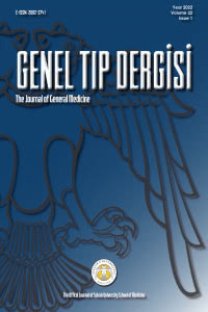Güneş tutulması sırasında geçirilen panik atak: Bir olgu sunumu
Panic attack experienced during solar eclipse: A case report
___
- 1. Abay E, Küçüktürk E .Depresyonda Sirkadiyen Ritimler . Depresyon Monografları Serisi İstanbul, 1994; 1: :281-92..
- 2. www.tug.tubitak.gov.tr/ tutulma.
- 3. Chotai J, Smedh K, Johansson C, Nilsson LG, Adolfsson R. An epidemiological study on gender differences in self-reported seasonal changes in mood and behaviour in a general population of northern Sweden. Nord J Psychiatry 2004; 58: 429-37.
- 4. Lee HJ, Kim L, Joe SH, Suh KY.Effects of season and climate on the first manic episode of bipolar affective disorder in Korea. Psychiatry Res 2002; 113: 151-9.
- 5. Molin J, Mellerup E, Bolwiq T, Scheike T, Dam H.The influence of climate on development of winter depression. J Affect Disord 1996; 12:151-5.
- 6. Akkawi NM, Agosti C, Grassi M, Borroni B, Pezzini A, Viqnolo LA.Weather conditions and transient global amnesia. A six-year study. J Neurol. 2006; 253:194-8.
- 7. Hinton D, Hinton S, Pham T, Chau H, Tran M.'Hit by the wind' and temperature-shift panic among Vietnamese refugees.Transcult Psychiatry 2003; 40:342-76.
- 8. Wood J, Hysong SJ, Lugg DJ, Harm DL. Is it really so bad? A comparison of positive and negative experiences in Antarctic winter stations. Environ Behav 2000; 32:84-110 .
- 9. Greenough G, McGeehin M, Bernard SM, Tranj J, Riad J, Engelberg D. The potential impacts of climate variability and change on health impacts of extreme weather events in the United States. Environ Health Perspect 2001; 2:191-8.
- 10. Westefeld JS. Severe weather phobia: an exploratory study. J Clin Psychol 1996; 52:509-15.
- ISSN: 2602-3741
- Yayın Aralığı: Yılda 6 Sayı
- Başlangıç: 1997
- Yayıncı: SELÇUK ÜNİVERSİTESİ > TIP FAKÜLTESİ
Üniversite öğrencilerinin sosyal destek ve yalnızlık düzeylerinin incelenmesi
Emel YILMAZ, Ela YILMAZ, Fatoş KARACA
B12 vitamin eksikliği ile birlikte görülen amyotrofik lateral sklerozis (Olgu sunumu)
FİGEN GÜNEY, HASAN HÜSEYİN KOZAK, EMİNE GENÇ, Demet KIREŞİ, Bahar KELEŞ, Hatice TOY
Sami ÖZTÜRK, Ercan GÇÖGELDİ, Cengiz Han AÇIKEL, Zafer ÇALIŞKANER, Muharrem UÇAR, Ahmet KORKMAZ
Hasan Basri ULUSOY, Hülya GÜLTEKİN, Nuran KÜÇÜK
Nadir görülen bir lenfoma türü: İntestinal lenfoma
MURAT ÇAKIR, TEVFİK KÜÇÜKKARTALLAR, Sevinç HÜSEYİNOVA, Ahmet TEKİN
Güneş tutulması sırasında geçirilen panik atak: Bir olgu sunumu
Akupunktur ile ağrı kontrolü ve nörotransmitterler
Kalp hastalığı olan ve olmayan gebelerde maternal ve fetal sonuçlar açısından bir fark var mı?
